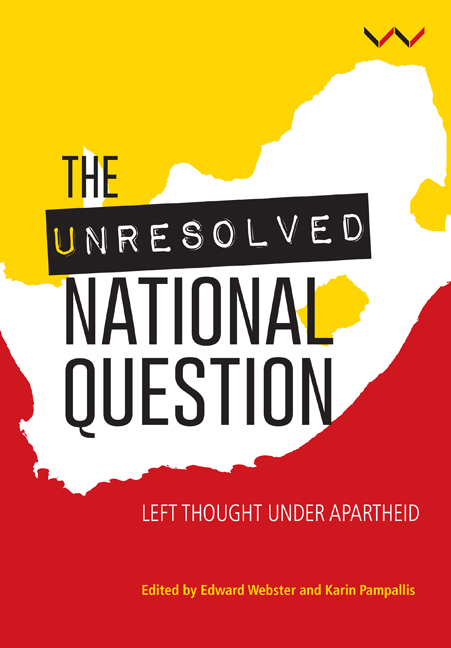Book contents
- Frontmatter
- Contents
- Acronyms and Abbreviations
- Preface: Edward Webster and Karin Pampallis
- Introduction: Revisiting the National Question
- PART ONE KEY FOUNDATIONAL TRADITIONS
- PART TWO CONTINUITY AND RUPTURE
- Chapter 6 Vicissitudes of the National Question: Afrikaner Style
- Chapter 7 Neville Alexander and the National Question
- Chapter 8 The Marxist Workers’ Tendency of the African National Congress
- Chapter 9 The National Question confronts the Ethnic Question
- Chapter 10 Variations on a Zulu Theme
- Chapter 11 Black Consciousness as Nationalism of a Special Type
- Chapter 12 Postponing the National Question: Feminism and the Women's Movement
- Chapter 13 Workerists and the National Question
- Chapter 14 Red, Black and Gold: FOSATU, South African ‘Workerism’, Syndicalism and the Nation
- Chapter 15 National Democratic Revolution meets Constitutional Democracy
- Biographical Notes
- Index
Chapter 9 - The National Question confronts the Ethnic Question
from PART TWO - CONTINUITY AND RUPTURE
Published online by Cambridge University Press: 21 April 2018
- Frontmatter
- Contents
- Acronyms and Abbreviations
- Preface: Edward Webster and Karin Pampallis
- Introduction: Revisiting the National Question
- PART ONE KEY FOUNDATIONAL TRADITIONS
- PART TWO CONTINUITY AND RUPTURE
- Chapter 6 Vicissitudes of the National Question: Afrikaner Style
- Chapter 7 Neville Alexander and the National Question
- Chapter 8 The Marxist Workers’ Tendency of the African National Congress
- Chapter 9 The National Question confronts the Ethnic Question
- Chapter 10 Variations on a Zulu Theme
- Chapter 11 Black Consciousness as Nationalism of a Special Type
- Chapter 12 Postponing the National Question: Feminism and the Women's Movement
- Chapter 13 Workerists and the National Question
- Chapter 14 Red, Black and Gold: FOSATU, South African ‘Workerism’, Syndicalism and the Nation
- Chapter 15 National Democratic Revolution meets Constitutional Democracy
- Biographical Notes
- Index
Summary
DISTURBING THE NATIONAL QUESTION
The National Question has predominantly been interpreted in the South African context as conceptualising the route to empowering an oppressed racialised majority. In this sense it has already been answered, it would seem, through the creation of a non-racial democracy based on shared citizenship. Black (as referring to a black African nation) majority rule was achieved with the overwhelming victory of the African National Congress (ANC) in April 1994. The consequence is that both ‘[c]lass and race mattered but, politically, race mattered more’ (Friedman, 2015: 146). Ironically, this liberal argument may also describe the approach of some South African Marxist theorists, including those of the South African Communist Party (SACP). As a first stage towards the overthrow of capitalism, it seems certain from present conditions that the revolution has been postponed until power is transferred to another political imagination.
Such postponement may well be the reason why the National Question continues to be asked, alongside the (always) incomplete National Democratic Revolution (NDR), despite all achievements towards and since the overthrow of apartheid.
However, my position is that it was never the right question to begin with, not in this recent (since 1910) nation state. The National Question relied on an assumed hegemonic and homogenising shared experience of racial domination among all black Africans. Steven Friedman writes about an anonymous article (revealed to be by Raymond Suttner, Jeremy Cronin and David Rabkin, all political prisoners at the time) in Africa Perspective (Anonymous, 1983):
… the authors argued that … the new Marxism [of the 1970s] did not understand how the ‘actual experience’ of black people under apartheid laid the basis for unity ‘under the banner of African nationalism’. It [the new Marxism] ignored ‘the National Question’: Marxism had long known that national territory, language or culture could unite people across class lines (Friedman, 2015: 154).
The contradictions were effectively ‘transcended’ within the ‘question’ as framed (Anonymous, 1983: 90), but continue to leave extreme traces of conflict unattended, postponed and even denied, as had been the case during years of struggle against apartheid.
- Type
- Chapter
- Information
- The Unresolved National Question in South AfricaLeft Thought Under Apartheid, pp. 163 - 180Publisher: Wits University PressPrint publication year: 2017

